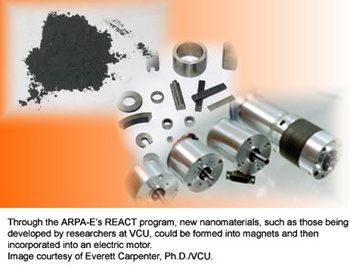Oct 17 2011
Virginia Commonwealth University has received a contract totaling $2.9 million from the U.S. Department of Energy’s Advanced Research Projects Agency-Energy, ARPA-E, to develop and design a new class of permanent magnets to be used in energy-efficient electric car motors or generators.
The VCU-led research is one of 14 projects being funded through ARPA-E’s Rare Earth Alternatives in Critical Technologies program, or REACT, which awarded a total of $31.6 million in funding to academic institutions across the country for similar projects last month.

The REACT program is focused on the development of alternatives to rare earth elements, which are minerals that occur naturally in the environment, for use in technologies such as electric motor and generator applications. This year, the REACT program received 89 concept papers and 14 were selected for funding. Read ARPA-E’s announcement here.
With a push for more energy-efficient and green-powered technologies, materials scientists are working to advance the field of magnets by creating permanent magnets that can perform equivalent to the best commercial magnets, and are less expensive than what is available on the market – without relying on rare earth elements. Rare earth elements are difficult and costly to process and refine the metal.
The goal of the three-year project at VCU is to use the magnetic carbide-based composite – which looks like a fine black powder – to develop a magnet for use in a prototype electric motor. The transition metal carbide nanomagnets, which require no rare earth elements, was developed by Everett Carpenter Ph.D., associate professor of inorganic and materials chemistry and affiliate professor of chemical and life science engineering, and his team at VCU.
“Recent market trends have made the production and procurement of rare earth permanent magnets more challenging and less cost efficient - creating a secure supply of these materials here in the U.S. is critical,” said Carpenter.
“This material represents a major paradigm shift. Traditionally, minerals such as iron, nickel, cobalt are mined from foundries, melted together, and fabricated just like you would steel. Our process is a chemical process that’s nanobased. The program, if successful, would result in the first commercially viable rare-earth free magnet in nearly 50 years,” he said.
According to Carpenter, the cost to produce this new magnetic material could be significantly reduced due to a simplified synthesis technique. For example, he said, the cost of making a rare earth magnet such as Samarium cobalt is approximately $70 per pound, but using the chemical process to create this new magnet could significantly lower production costs to $1.50 per pound.
The REACT program is focused on electric motor and generator applications, but the materials can be used in a host of other areas such as defense and telecommunications, said Carpenter.
Carpenter’s team has been working closely with Shiv Khanna, Ph.D., professor of physics, and colleagues in the VCU Department of Physics.
The VCU team, consisting of Carpenter and Khanna, is collaborating with research teams from Northeastern University, the University of California-San Diego, Brookhaven National Laboratory, Moog Components Inc., Arnold Magnetics Technologies and Bayer Technology Services – each will play a specific role in the development, design, optimization and manufacturing process of this new magnetic material.